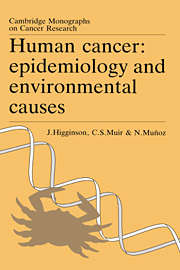Book contents
- Frontmatter
- Contents
- Contributors
- Preface
- Acknowledgements
- Historical introduction
- PART I Epidemiological methods
- 1 Introduction to cancer epidemiology
- 2 Descriptive epidemiology: the measurement of human cancer
- 3 Analytical epidemiology: techniques to determine causal relationships
- 4 Limitations of epidemiological methods in cancer studies: study of low-level risks: negative studies
- 5 Laboratory methods in epidemiology
- PART II Causative factors in human cancer
- PART III Legal and ethical considerations
- PART IV Introduction: total and specific site epidemiology
- PART V Buccal cavity
- PART VI Digestive system
- PART VII Respiratory system
- PART VIII Bone and soft tissue
- PART IX Skin
- PART X Breast and genitourinary system
- PART XI Eye and nervous system
- PART XII Thyroid and other endocrine glands, lymphoid and hematopoietic system
- PART XIII Cancers in children and multiple primary cancers
- Conclusions
- Appendix 1 Cancer statistics
- Appendix 2 A glossary of epidemiological terms
- Appendix 3 Acronyms and abbreviations
- Supplement
- Index
1 - Introduction to cancer epidemiology
Published online by Cambridge University Press: 03 May 2010
- Frontmatter
- Contents
- Contributors
- Preface
- Acknowledgements
- Historical introduction
- PART I Epidemiological methods
- 1 Introduction to cancer epidemiology
- 2 Descriptive epidemiology: the measurement of human cancer
- 3 Analytical epidemiology: techniques to determine causal relationships
- 4 Limitations of epidemiological methods in cancer studies: study of low-level risks: negative studies
- 5 Laboratory methods in epidemiology
- PART II Causative factors in human cancer
- PART III Legal and ethical considerations
- PART IV Introduction: total and specific site epidemiology
- PART V Buccal cavity
- PART VI Digestive system
- PART VII Respiratory system
- PART VIII Bone and soft tissue
- PART IX Skin
- PART X Breast and genitourinary system
- PART XI Eye and nervous system
- PART XII Thyroid and other endocrine glands, lymphoid and hematopoietic system
- PART XIII Cancers in children and multiple primary cancers
- Conclusions
- Appendix 1 Cancer statistics
- Appendix 2 A glossary of epidemiological terms
- Appendix 3 Acronyms and abbreviations
- Supplement
- Index
Summary
Introduction
The recording of mortality and morbidity from communicable diseases has a long history. However, although Pierre Louis described the importance of cancer statistics in the 1830s, the need to measure accurately chronic diseases in humans, such as cancer, was not recognized until the twentieth century.
Definition of epidemiology
Epidemiology, a science based on population measurements, can be described as the study of the distribution and determinants of diseases in human populations and the application of the results to their prevention or control. Unlike the experimentalist who controls risk factors and then observes their effects, the epidemiologist, in general, measures effects and then tries to determine the risk factors. In the traditional observational study, the investigator has no direct control over the assignment of risk factors and must rely on somewhat less efficient methods of design and analysis to uncover associations between the factors and disease endpoints. However, epidemiological methods can also be used to assess the impact of active interventions, introducing the concept of experimentation. The major types of epidemiological studies are:
(a) Descriptive: These studies examine differences in the distribution of disease occurrence with respect to population, place and time. These investigations include correlational analysis, case series and case reports. In general, such studies cannot address specific causal hypotheses, but may generate them.
[…]
- Type
- Chapter
- Information
- Human CancerEpidemiology and Environmental Causes, pp. 3 - 4Publisher: Cambridge University PressPrint publication year: 1992



